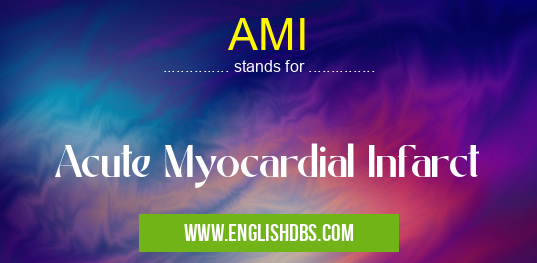What does AMI mean in MEDICAL
Acute Myocardial Infarct (AMI) is a life-threatening medical condition that presents as an interruption of blood flow to the heart, resulting in damage of the heart muscle. It is also known as a heart attack. AMI can cause serious health complications if not addressed and treated quickly.

AMI meaning in Medical in Medical
AMI mostly used in an acronym Medical in Category Medical that means Acute Myocardial Infarct
Shorthand: AMI,
Full Form: Acute Myocardial Infarct
For more information of "Acute Myocardial Infarct", see the section below.
Essential Questions and Answers on Acute Myocardial Infarct in "MEDICAL»MEDICAL"
What are the symptoms associated with AMI?
Common symptoms associated with AMI include chest pain or discomfort, discomfort in other areas of the upper body, shortness of breath, light-headedness, nausea, and breaking out into a cold sweat.
How is AMI diagnosed?
Medical professionals can diagnose AMI by running tests such as an electrocardiogram (ECG), echocardiogram (ECHO), cardiac enzyme tests, and angiography.
What is the treatment for AMI?
Treatment options for AMI vary depending on factors such as severity of symptoms and patient medical history. Common treatments for AMI include medications to break up blocked arteries or restore normal blood flow, restorative surgery, lifestyle changes like quitting smoking and eating healthier diets, or angioplasty.
Are there long term effects associated with an episode of AMI?
The long-term effects from an episode of AMI depend on how well it was treated at time of diagnosis and how much damage was done to the heart muscle. Possible long-term effects include decreased exercise tolerance levels due to reduced function in damaged muscle tissue, risk for developing an irregular heartbeat, increased risk for future coronary events or stroke, changes in lifestyle such as quitting smoking and avoiding stressors that may trigger future episodes of MI.
Who should get screened for potential signs or symptoms of Acute Myocardial Infarct (AMI)?
It is recommended that anyone who has experienced chest pain "at rest," shortness of breath during physical activity or difficulty breathing at night should be screened for potential signs or symptoms related to Acute Myocardial Infarct (AMI). People who are at higher risk are those who have any type of cardiovascular disease including diabetes mellitus; high blood cholesterol levels; obesity; family history; sedentary lifestyle; poor nutrition; smoking; alcohol abuse; and hypertension.
Final Words:
Acute Myocardial Infarct (AMI) is a serious medical emergency that should be treated promptly upon diagnosis in order to reduce risks associated with this condition such as possible long-term effects and future cardiac events. Knowing what signs/symptoms to look out for and seeking prompt medical attention when they occur can significantly improve outcomes.
AMI also stands for: |
|
| All stands for AMI |
